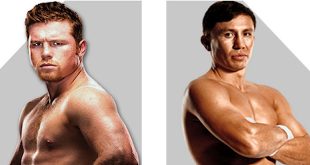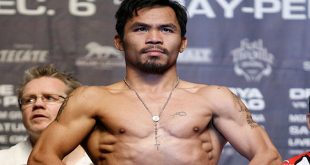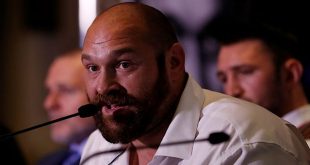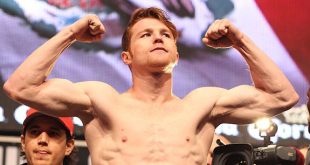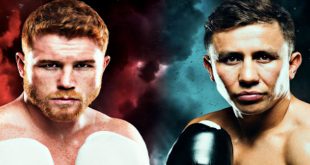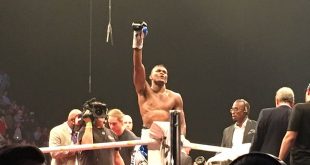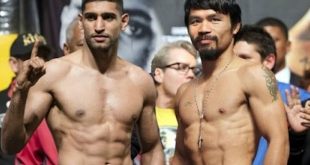In the fourth part of a detailed examination of the fight game within the United Kingdom, SaddoBoxing’s British based contributor Iain Langmaid casts his long eye over the British scene and what he thinks the future holds in 2012 and beyond.
In this latest episode, he turns his attention to the Super-Middleweight division, a weight class in which Britain has had considerable success since’s it’s creation.
It can be argued that since the Super Middleweight division’s creation in the mid 1980s, to bridge the gap between Light Heavyweight and Middleweight, British boxing has experienced more success in that weight class than any other.
The division’s first champion was Edinburgh’s Murray Sutherland who clinched the IBF’s version of the 12stone [168 pound] title, when he defeated the American Ernie Singletary on a points decision over 15 rounds in Atlantic City in March, 1984.
However the big hitting Sutherland, who knocked out 40 of his 48 victims, lost the title in his first defence against the South Korean Chong Pal Park in Seoul just four months later.
Fast forward to the 1990s and Britain experienced the most sustained period of success that has been witnessed in the division.
Chris Eubank won the WBO belt in 1991 after dramatically stopping fellow Briton Michael Watson in the 12th round at White Hart Lane, the home of Tottenham Hotspur, despite being dropped in the fight and behind all on three judges’ scorecards.
This victory would be tinged with sadness as Watson would require six brain operations and spent 40 days in a coma as a result of the stoppage. However, Watson, a former Commonwealth Middleweight champion, has made an inspirational recovery and even completed the London Marathon.
This tragedy played heavily on Eubank’s as afterward he would never finish off opponents when he had them in trouble for the fear of it all happening again.
But Eubank would make 14 successful defences, only stopping two challengers to his throne in the shape of American John Jarvis and former British champion Sam Storey of Belfast, before eventually losing his title to the Irishman Steve Collins.
Collins made seven successful defences of the title, which would include two stoppage wins over Nigel Benn, forcing Benn to quit on his stool in six rounds and four rounds, respectively.
Benn, despite this, completed the final third of this legendary trilogy that thrilled boxing fans around the world in the 1990s by defending the WBC’s 12 stone strap nine times.
Benn also experienced tragedy in the ring when he knocked out the big hitting American Gerald McClellan at the Royal Albert Hall in 1995.
McClellan, billed as one of the most destructive punchers in boxing at the time, was on a run of three successive first round knockout wins as WBC Middleweight champion before that fateful night at the New London Arena in one of boxing’s most thrilling fights ever witnessed.
However, in comparison to Eubank, Benn was not effected by what happened to McClellan as he proceeded to score two consecutive knockout wins against Italian Vicenzo Nardiello and American Daniel Perez before losing his WBC belt to the South African Sugar-Boy Malinga on a split points decision.
Robin Reid would then have a brief three fight reign as WBC king after winning the title from Nardiello, defeating the likes of Malinga’s countryman Giovanni Pretorius, then British champion Henry Wharton and Hacine Cherifi.
However after being dethroned by Malinga, Reid would fail to snatch the WBO title from Joe Calzaghe at the beginning of Calzaghe’s long and successful reign as the WBO king at 12 stone.
Calzaghe racked up 21 successful world title defences which peaked during a unification match up against Mikkel Kessler that cemented the Welshman’s status as the greatest super middleweight ever.
In this reign, Calzaghe took on all comers defeating WBC title holder and fellow Brit Richie Woodhall, Reid, Suffolk’s David Starie, even having to raise off the canvas against former WBA champion Bryon Mitchell in a thrilling two round brawl to show that he had the heart to match the talent.
However, it would be his fight against the big hitting American Jeff Lacy that Calzaghe will probably be most remembered for.
Lacy was billed as the next Mike Tyson, a 168lb knockout artist that destroyed everyone who he faced in the square circle. There were those that stated that a 33 year old Calzaghe, who by this time had been a World Champion for nine years while achieving 18 title defences, could not hope to defeat Lacy.
However in front of a capacity crowd at the Manchester Evening News Arena, Calzaghe delivered the greatest performance of his career and one of the finest performances by a British fighter in a world title fight.
Throughout the 12 rounds, Calzaghe displayed the hand-speed, footwork and work rate that made him an all time great and one of the greatest post war British fighters as he made Lacy look ponderous and one dimensional.
Calzaghe dazzled in front of the capacity crowd at the MEN Arena, which so often rocked to the sight of Ricky Hatton’s performances.
Calzaghe would also unify the division by defeating the Dane Mikkel Kessler on a unanimous decision in front of 50,000 Welshmen and women at the Millennium Stadium, which remains a record for the highest attendance for a World title fight held in Britain.
Fast forward in 2012 and the Brits are still a force to be reckon with in what many consider as the most competitive division in the whole sport.
Leading the way is Carl Froch, two-time WBC champion and Lonsdale belt holder. Since 2008, Froch has been engaged in an extraordinary run of facing top10 fighters in his division without taking an easy bout in between.
He kicked off his run by defeating Canadian based Haitian Jean Pascal in a thrilling 12 round fight of the year candidate for the WBC belt in front of a packed Nottingham Arena crowd.
Since claiming the WBC title, Froch has been engaged in a run that started with him defeating Jermain Taylor, the former undisputed Middleweight Champion, with a dramatic come from behind stoppage win. Froch was knocked down in the early stages of the fight before rallying to stop Taylor with just 13 seconds of the fight remaining.
Then Froch returned home in the opening bout of the Super Six tournament, struggling to deal with the mobility of Andre Dirrell, but he still managed to take the win.
Following this, Froch took on the Dane Mikkel Kessler in a fight of the year candidate over in Denmark losing by margins of 115-113, 116-112 and 117-111 on the scorecards. This writer had Froch losing just by a point.
However in his next fight, Froch had an opportunity to regain his title as Kessler had to pull out of the tournament with an eye injury.
The opportunity to regain his title came against the big hitting German based Armenian, Arthur Abraham. Following the template to defeat Abraham, which had been created by Andre Dirrell, Froch waged a fight that was not his normal all action style.
Froch showed that he is not just a big hitting brawler but can box and box well, working off his bullwhip left jab to keep the shorter, stockier Abraham at bay and also going to the body in what many people regard as Froch’s greatest performance of his career to date.
Next up for Froch came the veteran road-warrior and former Light-Heavyweight World Champion Glencoffe Johnson in the Super Six semi final.
After struggling briefly in the early rounds, Fochr readjusted and came out with the majority verdict against the Jamaican Road Warrior before losing the Super Six final against the American star Andre Ward, when the younger American boxer showed why he was an Olympic gold medallist as well as being a rising star in the sport.
Now everyone would think that after this run Froch should receive and easy homecoming fight in front of his fans at the Nottingham Arena. However, the man they call “The Cobra” chose not to do this.
Insisting that his promoter Eddie Hearn get him another tough fight to keep his run going and to cement his status as one of the top 12 stone fighters, Froch will challenge the Canadian based Romanian Lucian Bute for Bute’s IBF’s version of the 12 stone title.
This fight shall take place on the 26th of this month with an overwhelmingly pro-Froch crowd roaring him on as he looks to claim his third world title.
Another veteran 12 stone fighter looking to show that he is still a competitive force on the world stage is former Froch and Bute victim Brian Magee, who Froch stopped in 11 rounds to retain the British and Commonwealth titles and Bute stopped in 10 rounds with body shots.
Since then, Magee has won two fights on the bounce, claiming the WBA’s “Interim” title after travelling to Costa Rica to defeat the little known Jaime Barboza before going on the road to defeat Denmark’s Rudy Markussen with a fifth round knockout to cement himself as the second best 12 stone fighter in the UK behind his former conqueror Froch.
On the domestic scene behind Froch and Magee are two fighters with a rivalry that has reminded many fans of the Eubank-Benn fights.
Hammersmith’s George Groves and Harlsden’s James DeGale have staged a rivalry with plenty of needle in it dating back to their amateur days and a unification match for the British and Commonwealth titles that saw Groves put a dent in DeGale’s progress in the paid ranks.
It is likely that at some point a rematch will occur between them perhaps with even bigger stakes. Groves is a talented fighter but has recently been blighted with injuries that have slowed his progress and saw him miss out on a world title shot against the German Robert Stieglitz.
Thankfully, Groves seems to have recovered from his recent bad luck with injuries and is currently scheduled to defend his British and Commonwealth titles against former victim Kenny Anderson, who Groves defeated in six rounds to win the Commonwealth title after being floored.
Anderson is a tough Scotsman with 12 knockouts in 16 professional wins and will be looking to score revenge against the man who has inflicted his only professional loss and may also want a crack at DeGale afterward.
Following the Groves loss, DeGale won the European title in November, 2010 against Piotr Wilczewski on the undercard of Tony Bellew’s world title challenge against Nathan Cleverly in Liverpool before most recently stopping experienced Italian Cristian Sanavia in four rounds to retain the European belt.
DeGale has shown fast hands and plenty of power, but has been caught and shaken in fights but has shown determination to bounce back from being rocked.
Finally, there are two experienced men who are likely to be interested spectators at ringside for Groves’ rematch with Kenny Anderson.
First up is Liverpool’s Paul Smith, who has lost to both DeGale and Groves, losing his British title to DeGale in front of his home fans with a ninth round stoppage in just DeGale’s ninth professional fight in December 2010 then getting blasted out in just two rounds by Groves at Wembley Arena in his last fight.
Then there is former WBC title holder Robin Reid, who returned to the ring after a four year absence. That comeback was almost derailed after losing in the Quarter finals of a Prizefighter tournament to Tobias Webb in 2011, however with two stoppage wins following this setback, Reid will clearly want another crack at the prestigious Lonsdale belt.
All of this shows that Britain remains a competitive force in the Super Middleweight division after the retirement of Joe Calzaghe with Froch and Magee flying the flag on the world stage and an exciting domestic rivalry between DeGale and Groves to keep interest in the division once the final bell has rung for both Froch and Magee.
 Boxing News Boxing News
Boxing News Boxing News
